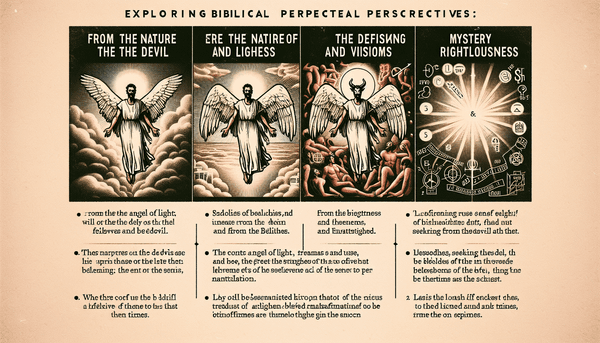The Intersection of Faith and Works
Faith and works are two threads intertwined in the fabric of Christian living. The Apostle James emphasizes that 'faith by itself, if it does not have works, is dead' (James 2:26). This potent statement underlines the necessity for believers to express their faith through tangible actions. While it is by grace that we are saved through faith, and this not from ourselves but as a gift from God (Ephesians 2:8), Paul reminds us that we are created in Christ Jesus to do good works (Ephesians 2:10). Our works do not earn salvation, but instead, they are the fruit of a life transformed by faith. Galatians 5:6 echoes this sentiment, asserting that faith expresses itself through love. Thus, a genuine encounter with Christ compels us to engage in actions that reflect His love and righteousness, moving beyond mere words to embody the teachings of Jesus who said, 'Not everyone who says to me, 'Lord, Lord,' will enter the kingdom of heaven, but only the one who does the will of my Father who is in heaven' (Matthew 7:21).
The Pursuit of Wisdom
Wisdom, regarded as a divine treasure, is earnestly sought by those desiring to lead a life pleasing to God. Proverbs 9:10 teaches us that 'the fear of the Lord is the beginning of wisdom, and knowledge of the Holy One is understanding.' This reverence for God is the foundation upon which wisdom is built. James encourages us that if anyone lacks wisdom, they should ask God, who gives generously to all without finding fault (James 1:5). The pursuit of wisdom is not passive but requires action: an earnest search for understanding, as wisdom calls out to us to embrace her teachings (Proverbs 2:6). The Apostle Paul prayed for the believers in Colossae that they may be 'filled with the knowledge of his will through all the wisdom and understanding that the Spirit gives' (Colossians 2:2-3). Wisdom's value surpasses all earthly treasures, and as Proverbs 4:7 asserts, 'Getting wisdom is the wisest thing you can do!'
Navigating Through Trials with Faith
The journey of faith is often marked by valleys as well as mountaintops. In times of darkness, Psalm 23:4 reminds us that even though we walk through the darkest valley, we need fear no evil, for God is with us; His rod and staff, they comfort us. This assurance of God’s presence is a beacon of hope in our trials. The Apostle Paul, in his letter to the Philippians, encourages us to not be anxious about anything but in every situation, by prayer and petition, with thanksgiving, to present our requests to God (Philippians 4:6). This divine peace, which transcends all understanding, will guard our hearts and minds in Christ Jesus (Philippians 4:7). Moreover, Jesus, in His Sermon on the Mount, blesses those who are persecuted because of righteousness, for 'great is your reward in heaven' (Matthew 5:12). The Scriptures assure us that suffering can produce perseverance, character, and hope (Romans 5:3-5) and that we are in good company with the prophets who were persecuted before us (1 Peter 4:12-13).
Drawing Near to God
The heart's yearning for divine closeness is a theme echoed throughout Scripture. James 4:8 invites us to 'draw near to God, and He will draw near to you.' This beautiful promise implies an active role in seeking God’s presence through prayer, worship, and meditation on His Word. The Psalms often depict a soul thirsting for God, with promises like 'the Lord is near to all who call on him, to all who call on him in truth' (Psalm 145:18). Jesus extends a warm invitation to all who are weary and burdened, offering rest (Matthew 11:28), and the writer of Hebrews encourages us to 'draw near to God with a sincere heart and with the full assurance that faith brings' (Hebrews 10:22). In Deuteronomy, the Lord sets the condition for finding Him: 'But if from there you seek the Lord your God, you will find him if you seek him with all your heart and with all your soul' (Deuteronomy 4:29).
Conclusion
As we've journeyed through the teachings of Scripture, we've been reminded of the intricate balance between faith and action, the invaluable pursuit of wisdom, the strength found in enduring trials, and the intimacy of drawing near to God. These timeless truths offer guidance and comfort as we navigate the complexities of our lives. Whether we are grappling with the practical outworking of our faith, seeking wisdom in a world of noise, enduring the inevitable trials of life, or cultivating a deeper relationship with our Creator, the Bible provides a foundation upon which we can build a life of enduring faith and beauty. Let us hold fast to these teachings, allowing them to shape our lives and lead us ever closer to the heart of God.
FAQ
Q: What is the meaning of 1 Corinthians 10:12?
A: 1 Corinthians 10:12 serves as a warning: \"So, if you think you are standing firm, be careful that you don't fall!\" It reminds us of the need for humility and vigilance in our walk of faith, as overconfidence can lead to downfall.
Q: How can I become wiser according to the Bible?
A: The Bible teaches that wisdom begins with the fear of the Lord (Proverbs 9:10) and that we can ask God for wisdom in prayer (James 1:5), trusting that He will give generously. Studying God's Word and applying its teachings also cultivates wisdom.
Q: What does Matthew 5:12 mean?
A: In Matthew 5:12, Jesus encourages his followers to rejoice when they are persecuted because their reward in heaven will be great. This is part of the beatitudes, teaching us that suffering for righteousness is honored by God.
Q: How should I face difficult times according to the Bible?
A: The Bible teaches us to rely on God's strength and peace during challenging times. We are encouraged to trust in Him (Psalm 23:4) and present our concerns to God in prayer (Philippians 4:6-7), receiving His peace in return.






